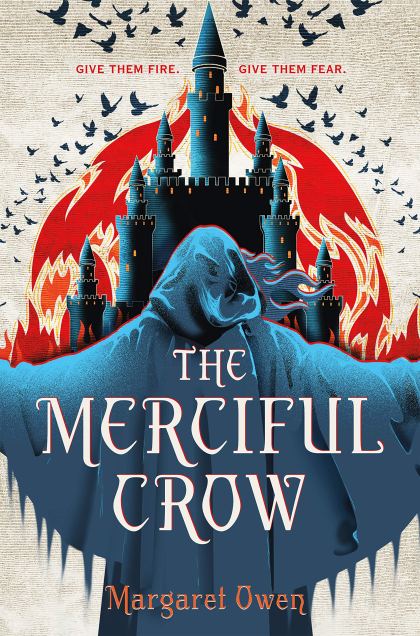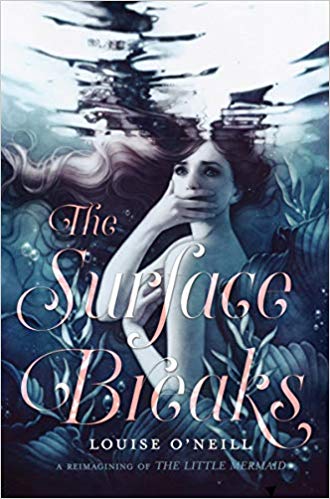
“How much more, the prince had asked, will you let them take? This was the dance. This was the game. The one she wasn’t meant to win.
But now – she had fire. She had steel. She knew her road” (Owen 2019, pp. 331-332).
I absolutely adored this book! While it might’ve been a little difficult to get into at first (the language and world are complex and not immediately explained), once I was hooked I found it almost impossible to put down. Owen has built a fantastic world, jam-packed with interesting characters and complex lore. Even better, the lore is based on types of birds and their strengths, putting this book right up my alley.
The Merciful Crow transports us to the fictional kingdom of Sabor, where people are divided into castes based upon their Birthrights and individual powers. Phoenixes, for example, are the ruling class, and have the ability to both create and resist fire. Similarly, Vultures are given the ability to hunt, while Owls are given scholarly wisdom. Fie, a young Crow, is used to being the lowest of the low, destined only to follow plague beacons and offer a merciful death to their victims. As Crows are impervious to the plague, they are looked down upon and persecuted by the other castes despite the useful service they provide.
Fie, who has trained her entire life to be the chief of her clan, has her world flipped upside down one night when her band of Crows is called to the palace to dispose of the bodies of the prince and his trusted guard. To her shock and horror, however, the two are only pretending to be dead, and strike up a bargain with Fie’s Pa to escape the murderous queen: transport them safely to their allies, and Crows will be protected by appointed Hawks in the future. For a caste frequently targeted by Vultures and other groups, this offer seems too good to pass up. Though Hawks and Phoenixes have traditionally never spoken to or interacted with the lowly Crows, Prince Jasimir and his friend Tavin must now live like Crows… or risk dooming the entire kingdom to the reign of a cruel and ruthless queen.
As I said before, this book is chock full of interesting lore, from the Birthrights of each caste, to the ancient wisdom of the old gods and the Covenant. There are even old songs and stories passed down from each generation to the next, something I’m sure that Owen has written and stored in her own personal database somewhere. What results is a world that feels very rich in detail, a world that pulls you in and makes you want to know more. One such example of rich detail can be found in the names of the characters, as all Crows are traditionally named the first foul word spoken to them. Thusly, characters like Fie, Swain, Hangdog, and Wretch exist alongside those with more ordinary names.
The story does not hold your hand at all, however; it throws you right into the action and challenges you to fill in the blanks of this universe as you go. The book includes both a map and a basic description of each caste and their powers in the front, which serves as a helpful guide while tracking the story’s action, but this might prove to be a little much for the reluctant or uninitiated reader. For me, however, this was immensely fun and fulfilling, as it kept me interested in slowly piecing the puzzle together.
Another thing I really enjoyed was the romance, which I felt was incredibly well-developed. I have always been a huge fan of romance, both as the main plot and as a sub-plot, and am a well-known sucker for a well-written love interest. I especially love a romance that develops slowly, and give bonus points if that romance turns from mutual dislike to love (also known as the “love-hate” relationship). Fie and Tavin fulfill this role perfectly, butting heads in the beginning while having excellent chemistry and an obvious attraction to one another. Their journey from enemies, to friends, to lovers felt very natural and well-deserved, and I appreciate Owen’s ability to really get me attached to the characters and their romance as I read.
In addition to excellent lore and romance, this book is also full of subtle yet poignant political commentary about classism and the abuse of power. As a Crow, Fie and her fellow clan members have gotten used to being treated lower than dirt, and don’t even blink at their mistreatment. Tavin, on the other hand, has been raised as a Hawk his entire life, and takes great pride in his caste’s call to protect others and uphold the law. He is horrified, however, when he sees how Crows are treated, often having to bite his tongue to keep from speaking out against the injustice from his own caste. Prince Jasimir, as a Phoenix, has to learn to humble himself in order to understand plights he has never had to face. In essence, he is forced to “check his privilege” in order to gain empathy for those beneath him. I think this is important for teens to grasp, as many of them may have grown up with privileges they’re unaware of. The Merciful Crow confronts these privileges (privileges such as knowing help will be offered when seeking it from those sworn to protect you) in a way that never feels preachy or overt, and I appreciated the subtlety of the writing.
At the risk of praising this book into oblivion, I also really enjoyed both the cultural and sexual diversity in this book. Several characters, including Prince Jasimir himself, allude to being either gay or bisexual, and no big deal is ever made of this fact. For example, Tavin mentions that all of the lords and ladies of the land had been “throwing their sons at him” in the hopes of marrying into the royal family, demonstrating that one’s sexuality is inconsequential in the face of wealth and power. As always, I really appreciate seeing the LGBT community represented casually, and I hope Jasimir is given a love interest of his own in future books.
Along with LGBT representation, there is also a great deal of racial and cultural diversity in this book. The Crows speak in what seems to be a Scottish accent, with words like “ken” and “aught” being thrown around frequently. Fie is described as having brown skin, though it is never clear exactly what her ethnicity is. The rest of the Crows are also seen as having darker skin, and while it is never expressly stated, I believe Jasimir and Tavin are this universe’s version of Middle Eastern in appearance. Though some might take issue with the fact that most of the characters of color are the ones looked down upon in this universe, I think this is making yet another political statement about how people of color are treated by those in power in our own society.
I could honestly go on and on about this book for pages, but I don’t want to give away more of the plot than is strictly necessary. Suffice to say, this was an immensely enjoyable ride from beginning to end, and I’m extremely glad I picked it up. It’s full of magic, suspense, romance, adventure, and intrigue. The characters are complex and lovable, the story is compelling, and the world-building is both complex and extremely well done. I would recommend this book to fans of both fantasy and romance (though maybe not to reluctant readers due to its complex language), and I’m eagerly awaiting the release of the sequel next year.
Reference:
Owen, M. (2019). The merciful Crow. New York: Henry Holt and Company.
